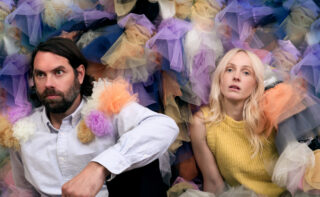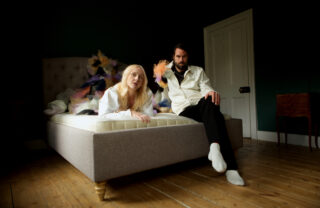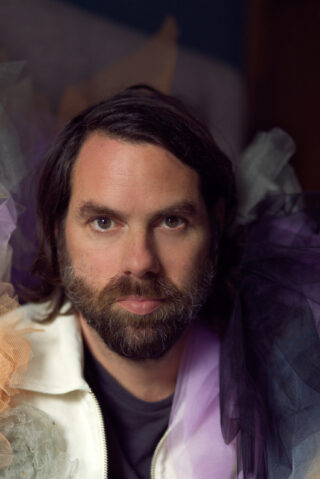Furry logic: in conversation with Laura Marling and Mike Lindsay on the return of LUMP
The folk icon and psych innovator on coming back to their unexpected – and brilliant – collaborative project

The folk icon and psych innovator on coming back to their unexpected – and brilliant – collaborative project
Just days after meeting for the first time, Tunng’s Mike Lindsay and Laura Marling went to the studio and started recording their collaborative album, 2018’s LUMP. It had only ever been intended as a one-off project, but the exhilaration they found in touring that excellent, strange record led them back to the studio in 2019. Held up by the pandemic and focusing on their own projects last year (Tunng’s Dead Club and Marling’s Song For Our Daughter), when I meet them in a rehearsal space in East London they are finally preparing to get their second album, Animal, out into the world. It’s a listen that takes the twisted imagination of the first album and turns it up a notch, all phenomenal, fantasy joy and soaring, unsettling darkness – almost like something you might find on the soundtrack for a film like Labyrinth. Marling meets the engaging sonic adventure of Lindsay’s music with crisp vocals, speaking to life beguiling poetic lyrics. All together it feels quite magical and understandably they’re both ebullient in reunion, ready to return to the fascinating universe of LUMP. We speak about their creative process together, the year in pandemic, and the furry puppet creature that represents the duo.

Tara Joshi: With this record, from what I’ve read about it, it wasn’t like you stayed in touch in a very in-depth way in between the two albums.
Mike Lindsay: What have we been saying!? It’s true, we haven’t been, you know, hanging out that much in between – it is more of a working relationship than a drinking one [laughs].
LM: By design, in a nice way! It’s not that we don’t like each other.
ML: We just don’t like talking [laughs]. But no, we have a method of working that we wanted to recreate on this new record. Laura won’t hear anything until she comes to the studio, so there’s an immediate reaction, so we tried to recreate that again.
TJ: What makes a LUMP song?
ML: On the first record, I had no idea because it didn’t exist. It was just a set of textures that I was enjoying experimenting with – those breathy, wooden, organic textures mixed with ’70s electronic gubbins. So I wanted to keep that flavour in mind for the new record – it’s quite a different record, but there are properties that are the same. And I think because we invented the character of Lump, that helped me with the music and imagining a parallel universe. What would Lump be listening to while walking along his odd pathway? So I was thinking about things like that. Also with this record I had just moved to Margate and, a bit cheesily, I was taking lots of walks by the sea. I heard about waves coming in cycles of seven. And then I thought about waves and other things that are waves – like Gamma Ray is one of the titles of the tracks – and I was thinking about radio waves and things like that. So a lot of the tracks are in 7/4, which is really annoying for us now.
LM: Really annoying.
ML: Because we’ve got to learn how to play that properly. It’s difficult timing. But it’s quite nice to have a set of ideas that you can play with.
TJ: You were speaking about the creature of Lump – how did Lump manifest?
LM: The name was from my goddaughter who was five at the time. So Lump, the way that she conceived of it, made it feel like it was a character rather than a band.
ML: Yeah, or even just the word ‘lump’, your description of the way she said ‘lump!’ – it felt like something childlike; but that word conjures up lots of other connotations…
LM: Yeah, don’t Google ‘lump’.
ML: It brings to mind negative bodily situations, but it was so innocent, Laura’s description of the way her goddaughter said it. But I don’t know when we decided Lump would be a creature.
LM: I think we thought it might be more appropriate to make something that represents the sum of our parts rather than both of us individually. Because the music came out so organically, and randomly, so it felt easier to shift it onto something else. That’s probably why.
TJ: It’s interesting that you talk about the dark connotations of the word lump. I feel like on both albums, there’s this unsettling undertone. Is there any degree of intention or discussion of how that happens?
ML: No, but I think that’s where the “greater than the sum of its parts” thing comes in.
Not having conversations, not being friends [laughs]. I think creating a world with darkness and pockets of joy and trying to seamlessly – or not so seamlessly – blend the music and the tracks into each other, creating a journey, it seems to be part of an unsaid thing that we’re trying to do with Lump.
LM: The lyrics are obviously a reaction to the music – in the chicken and egg scenario here music is coming first. And to my ears, it’s very detailed and textured so I’m responding to something quite clear in the music.
TJ: What does this project allow that you don’t already do in your own work?
ML: Well, it’s very different from my world with Tunng, because there’s six people in Tunng whereas I get to do what I want with Lump. Which I do with Tunng as well, but it’s just a way to explore new avenues and really dive into whatever you want to do and create a whole new persona, musically. Tunng have done seven albums, and there’s a flavour that we created and we work within that flavour. And it touches on things that are happening in Lump, but this is a lot freer for me.
LM: It’s the same for me really. I guess I have a lot of autonomy in my other persona, but it’s quite nice to have limitations and a limited role as well. Laura Marling as a persona began at 15 or 16, and this one began at 28, which is, you know, very different. This is a much more freeing experience. And it’s acting as well, it’s like a play or something.
ML: I like how you say, ‘Laura Marling as a persona’.
LM: Yeah, how fucked up is that!? [Laughs] Talk to my analyst.
TJ: I read that you were studying psychoanalysis, Laura. Has that played much of a part in what you’re doing lyrically here?
LM: It did have quite a big effect on the lyrics. My glossary was psychoanalytic terminology. And also psychoanalysis, which is generously a very soft science – it’s not very rigorous. So it’s quite weirdly poetic, because it’s trying to describe things that are very intangible. And that was what I enjoyed about psychoanalysis as well. It has a lot of language to describe intangible experiences, which I think gives that ominous sensation. Particularly ‘Red Snakes’, which is all psychoanalytic imagery. I like it as a poetic source.
TJ: So you recorded this a couple years ago, in 2019, but paused on the release during… everything?
ML: We both had other projects out last year and made a conscious decision to not put this out until we could just be in the same room again and connect in that way.
TJ: Weirdly, the album sonically feels fitting for this time. Obviously, it wasn’t recorded during the pandemic, but it marries this exploratory imagination and possibility with an undercurrent of darkness.
LM: Yeah, there is this mournful hedonism. I hadn’t thought about that, but maybe it is a good thing for this time – especially this weird, anxious time. People are trying to conceive of a golden age that’s coming, where we will feel comfortable being out and partying again, but I think there’s gonna be months and months of this weird, anxious time. So yeah… listen to the Lump album to help you through!
ML: Well, it’s got an escapism aspect to it, in the way we wrote it and the way that it sounds. Part of that’s quite apt when people want to think about alternate realities of certain things that are going on.
TJ: How has the past year been for you? Obviously you’ve both been putting out your own projects, but for everyone it’s been a really weird, tough, precarious year.
ML: Personally, my experience of lockdown was quite sweet. My studio’s in the house, I got engaged to my girlfriend, I made lots of good music which is going to come out hopefully with the next Lump record, and I’ve been mixing records for people remotely, walking along the beach. But in terms of the rest of the world, the year’s been a total disaster.
LM: I had most of my year like Mike’s. But then in the last couple of months, I’ve had a couple of people die. The experience of death has been making me think about what is maybe a more universal feeling. I never was bothered by art galleries, I’ve loved going to art galleries and whenever we’re on tour I try to go to cathedrals or whatever. But it’s never been a huge deal, and I didn’t really think about it the first year of lockdown. But now, I really want to go somewhere and be spiritually devastated by something. I really want that feeling. And you can have it at music shows too, that physical, energetic thing – whatever it is when you’re looking at an amazing painting and it devastates you. I really want that. I think there’s going to be a public mourning period before it becomes ecstasy, for people who have had an existential time maybe.
ML: It’s interesting that these things have been around us for our whole lives, and we take things for granted. That experience, that emotional thing of being engulfed by art or something that speaks to you, personally, that you haven’t been able to do for a while. It’s going to reflect on the situation that everyone’s dealt with.
LM: Exactly, it’s gonna be loaded with meaning.
ML: The fact that a lot of people died, we’ll never have that experience again. I think, as you said, that’s what people get when they go to see bands. It’s different when you’re playing on stage, but I love to go and see bands as well. And I think that feeling where you’re in amongst people when it’s happening in the moment, and the sounds coming out and there’s joy, there’s sadness, or there’s euphoria – that has been lost for so long now, it’s an alien feeling.
TJ: We touched on the hedonism element of the record, and I wondered if this creature experiences the real world repercussions of that, or is it more Dorian Gray style?
ML: I like that that’s what you get from it.
LM: I guess there’s references to time passing and to angst, so I imagine that there are anxious consequences to hedonism. Mike, do you really engage with the lyrics? I don’t know what your experience of listening to the album is like.
ML: I listened to it on the train on the way down, great lyrics I thought! [Laughs] When you first write them I’m so in the moment I’m not really aware of the gravitas of the lyrics. I’m just trying to think about the timbre and the feel, and it does take a little while for everything to sink in. I definitely don’t always understand the narrative, if there is one that you’re trying to tell, or the roots of some of those phrases.
LM: Best not to pull at that thread.
ML: [Laughs] That’s why it’s nice to not pull at the thread. I think that the lyrics are poetic and twisted, and they speak in different ways, but Laura knows something about them that no one will ever know. So we don’t ask each other. Well, I don’t ask you much about the lyrics, I just say things like, ‘bad ass!’.
LM: [Laughs] Or “Stop singing in an American accent!”


TJ: How does that collaborative process work? I know you mentioned the time signatures being tricky, so Mike would you ever feed back if a lyric didn’t necessarily fit the timing? Or do you both keep that relative autonomy?
ML: We’ll discuss things like that, I might suggest trying things in a certain way.
LM: He also might say “I’m not feeling that”, and usually I agree. Sometimes you’re trying to trim something around the edges and force it into shape, and sometimes it just doesn’t work. And you can both feel it going limp – sorry, that’s a bit gross. Occasionally I cannot get my head around the time signature. And so Mike will literally drum it into my brain.
ML: Yeah sometimes I’d count for you, and for myself. Because I’m there cursing why I’ve bothered trying to do these time signatures. With ‘Gamma Ray’, which is the hard one, Laura went down to the kitchen and said, “I just need to go down there and figure something out”. I think we’d spent about four hours trying to figure something out over this time signature. Actually at one point while you were down there, I was trying to make the whole thing into 4-4 because I thought “Forget it, it’s not working”. And then about 20 minutes later, you came up with the whole first verse in this excellent format. And amazing lyrics – hairs on the back of my neck vibe – and laid it straight down. There were moments like that where we had to have some discussion, but then she just nailed it.
TJ: You both did, it’s a great body of work. What are your tour plans?
LM: I’m really looking forward to doing it live. We’ve got shows in August and September. The shows we did for the last album were amazing – I mean, amazing for us because it was like a 32-minute album and we made 45 minutes out of it and did it twice a night. I really like that, because I don’t like the commitment of going to a two and a half show where you only know three of the songs.
ML: But we are making a three hour show out of this now [laughs]. It’s quite a complex record so I think it’s going to take a little bit of time to feel fluid, but there’s lots of wigout potential. I was in here last night alone wiggin’ out. So I think it’s gonna be a sonic sound bomb live, hopefully.
TJ: Will the puppet be involved?
LM: If it doesn’t involve the puppet I’ll be very upset. The plan is to have it on a very intricate pulley system.
ML: That’s the plan. Lump – he, she, they… Lump’s gonna be knocking around at the shows somewhere.
Photography by Tamsin Topolski